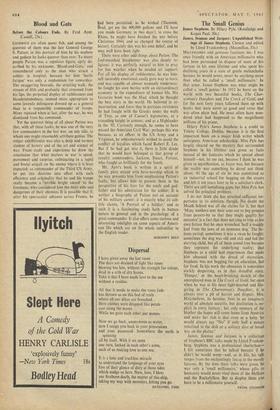Blood and Guts
Before the Colours Fade. By Fred Ayer. (Cassell, 25s.) GENERALS are often queer fish, and among the queerest of them was the late General George S. Patton; in this portrait of him by his nephew and godson he looks queerer than ever. To many people Patton was a repulsive figure, aptly de- scribed by his nickname, 'Blood-and-Guts,' and remembered only as the man who struck a soldier in hospital, because for him 'battle fatigue' was only a euphemism for cowardice. The swaggering bravado, the strutting walk, the stream of filth and profanity that streamed from his lips, the perpetual display of ruthlessness and bloodymindedness, seemed more appropriate to some juvenile delinquent dressed up as a general than to a responsible commander of troops. Many rejoiced when at last, after the war, he was dismissed from his command.
Yet the queerest thing of all about Patton was that, with all these faults, he was one of the very few commanders in the last war, on any side, to whom one might reasonably attribute genius. The vulgar exhibitionist was also a, deep and earnest student of history and of the art and science of war. From study and experience he drew the conclusion that what matters in war is speed, movement and surprise, culminating in a rapid and brutal assault on the enemy where it is least expected; as commander of the Thiid US Army, he put this doctrine into effect with such efficiency and originality that he and his troops really became a Nerrible bright sword' to the Germans, who considered him the most able and dangerous of their enemies. It is possible that if, after his spectacular advance across France, he
had been permitted, as he wished ('Dammit, Arad, get me the 400,000 gallons and I'll have you inside Germany in two days'), to cross the Rhine, he might have finished the war before Christmas 1944, and so changed the course of history. Certainly this was his own belief, and he may well have been right.
There were other odd things about Patton. The foul-mouthed blasphemer was also deeply re- ligious; it was perfectly natural to him to pray for fine weather when he needed air support. For all his display of ruthlessness, he was him- self incurably emotional, easily gave way to tears, and was capable of almost womanly tenderness; he fought his own battles with an extraordinary economy in the expenditure of human life. His favourite book was the Iliad, which he thought the best story in the world. He believed in re- incarnation, and knew that in previous existences he had fought with the Greeks under the walls of Troy, as one of Caesar's legionaries, as a crusading knight in armour, and as a Highlander in the '45. Curiously enough, he seems to have missed the American Civil War; perhaps this was because, as an officer in the US Army and a Virginian, he subconsciously wished to avoid the conflict of loyalties which faced Robert E. Lee. But if he had got into it, there is little doubt that he would have belonged to that group of cavalry commanders, Jackson, Stuart, Forrest, who fought so brilliantly for the South.
Mr. flyer's book is written in a spirit of family piety mixed with hero-worship which in no way prevents him from emphasising Patton's faults, but allows him to present them in the perspective of his love for the uncle and god- father and his admiration for the soldier. :It is neither a biography of Patton nor an account of his military career; it is exactly what its sub- title claims, 'A Portrait of a Soldier,' and as such it is a fascinating study both in human nature in general and in the psychology of a great commander. It also offers some curious and interesting sidelights on some aspects of Ameri- can life which arc on the whole unfamiliar to the English reader.
OORONWY REES


































 Previous page
Previous page